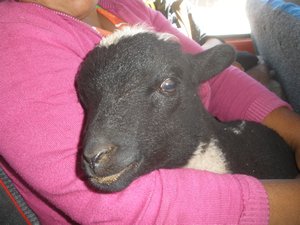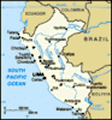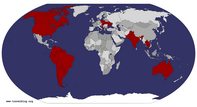Advertisement
Published: July 12th 2010

 Keeping Me Company
Keeping Me Company
I hadn't ridden with livestock since traversing Honduras...The problem isn’t getting to Huancavelica from Huancayo to the north. It is trying to arrange any sort of transportation from the departmental capital moving south to Ayacucho. This missing link assures that foreigners will not go out of their way to spend time in the area. Until a bus link is established, Huancavelica will remain very quiet and its potential underdeveloped.
“Four?” Then there was a very deafening pause, “In the morning?”
“I told you, that’s the only way we can get out of town without going back to Huancayo.” And I am NOT going back to Huancayo, so help me! I failed to verbalize that last point to her. Rosalinda was discovering the ins and outs of getting around Peru. Moreover, being from Juliaca in the flatlands of the south around Lake Titicaca, the rules and particularly the concept of travel time in the Central Highlands are totally different.
She let out a puff of resignation and acceptance. “I’ll set the alarm for three thirty,” she squinted.
“Three, Rosalinda.”
“Why so early? We will already shower and have packed.”
“It’s better to be a half hour early than five minutes late.” Rosalinda ingested the expression and acknowledged its value.

 She's Done This Before
She's Done This Before
There are other things on her mind besides the cramped conditions...It didn’t make her like it any more.
We checked out by gently placing the room key on the top of the reception counter. Rosalinda’s backpack was securely fastened and she was mobile without having to drag anything. We entered the chill of the morning. The cathedral clock read three twenty. We had a four-fifteen departure. There were no taxis anywhere on the main square. Nothing stirred. As we marched over cinder blocks and tripped over construction debris I reminded Rosalinda, “Glad you have the mochila now?”
It clicked for her. “Sí…I get it. If I had my wheeled suitcase…”
“You’d have to drag it through all the rocks and gravel. You’d be miserable. You need the backpack only ten percent of the time. But those few instances justify its use over a normal suitcase. It may not be refined, but-”
“I get it now.”
Two haggard buses awaited the passengers at the cold and desolate depot. Dozens had already gathered. The window where we bought our tickets about ten hours ago was lit by a single naked light bulb. Ten men wrapped in alpaca tops and knitted hats huddled together in line. By making a quick head count,

 Knees To Your Chin
Knees To Your Chin
Be aware: There are five passengers BEHIND me...the bus company was selling tickets for SRO, in baseball terms….standing room only. We had our seats confirmed, but anxiety sank in that the ticketing system would not be honored. I told Rosalinda to survey which bus was ours and she disappeared. Passengers kept silent but to lift gigantic burlap sacks of merchandise up to the roof racks of each vehicle. The backdoor route out of Huancavelica was just as crucial for freight as for human cargo. I took seat twenty-five along the window. I always insist on the window, even in planes. This would turn out to be a grave error on my part. Rosalinda took twenty-six. Chalky dust had settled into become a permanent part of the drab seat cushions. I took a deep breath and felt the particles making their way down my trachea. The interior of the coach was dark and frigid. We did not expect any heat while aboard; Rosalinda cleverly brought with her a woolen blanket from Lima. That forethought was about to payoff…for me. Passengers piled onto the bus. Some took their assigned seats after stuffing all types of bags and sacks in the overhead storage area from which straps swung as low

 Are We There Yet?
Are We There Yet?
One happy family...as the tops of the seated passengers’ heads. More pushed their way into the aisle, claiming not a seat but a place to stand, hopefully with the chance to lean their hip against a headrest for some kind of comfort. Rosalinda wrapped us in the blanket. Everything seemed fine. If everything went according to schedule (Fat chance!) we’d be in Ayacucho by 12:30 this afternoon, no big deal.
The bus speeds on the gravel road and rattles violently. There is no way to dismiss the hours of relentless racket we have coming to us. I gaze up at the plethora of stars I only get to witness on this side of the equator. The mountains hide in their own shadows. Dawn will not be for another two-and-half hours. Otherwise there is very little to see, much less to do. A chill creeps under the blanket that I cannot abate. The latch to the window in front of me is loose and will not secure itself to the frame bolted into the wall. The window slides open just enough to let in a rush of frigid air. I look down at the road at forty miles per hour and can see the moonlight reflect on frozen puddles. Every few minutes I pull the window shut. After the fifth or sixth attempt, I surrender. Over time, the route to Rumichaca has slowly taken its toll on the bus. It has begun to unravel little by little. I flop in my seat but cannot elude the sinister draft. I place my daypack on my thighs. I sigh. It’s going to be a rather uncomfortable trip. Every now and then I get off the bus to relieve myself against the wall of an adobe dwelling.
I do not complain to Rosalinda, yet she takes notice and removes her winter coat. I am moved by her sacrifice. She stuffs it between the window and the seat in front of me. She then wraps her scarf around my neck. The blanket that covers our laps can be opened. She doubles the slack and reinforces me with it. I look ridiculous. I successfully view my breath in the cabin of the bus as I exhale. I thank her and somehow she manages to sleep through the dawn. Where did I find this woman?
Rumichaca is the end of the bus line and where we need to disembark to wait for a collective van to take us the remaining three hours to Ayacucho. It is a collection of cement huts, each of which provides a rudimentary service. The row huts are no more than six or seven. They are set back no more than twenty feet from the road. Diesel dump trucks thunder past, kicking up trash and an amber powder. One hut is for chicken soup. I make an immediate connection between the eatery tent and the hens pecking at the viscous mud. Another hut is a ticket counter for the van to Ayacucho. The ones beyond that do not garner enough of my attention to even care. Women disappear behind the huts to supposedly pee. The men need no such discretion. A stiff wind bounces hollow plastic refuse in the direction of a babbling river. The stray dogs battle for scraps and growl menacingly.
A red van arrives an hour after we are dumped in Rumichaca. Rosalinda pops up off her backpack and sprints after it to ensure it is the one destined for Ayacucho. She signals to me in the affirmative. I waste no time and we claim seats in the back. It is going to be a tight fit. Our packs are tethered to the roof rack along with more cumbersome sacks of some mysteriously valuable commodity. An Ayacuchano family of five welcomes us. However hard to believe, we move to the two-lane toll booth with TWENTY-THREE human beings crammed into a space designed for an amorous couple to frugally travel a week while camping in a tent. The fold-down seat in front of me pushes my shins upwards until they are immobile. I strain to move either ankle. The best part? My travelling partner is no longer Rosalinda, whom I could use as a pillow. Instead I have a recently arrived black lamb. It lets out shrieking bleats that make me flinch. Its owner is holding it by all fours. I struggle to move my legs away from it so it doesn’t soil me. From the other side, Rosalinda caresses it caringly and speaks to it like a drowsy toddler. She is looking to adopt it. I envision it, once again, on my plate aside a copious portion of mint jelly.
Twelve hours into the three hour ride, Rosalinda yells out to me, “Did you see it?”
“What?”
“You know, what you have been complaining about since arriving in Peru.” Last year, it took over two weeks in Australia before I go to see a live kangaroo hop around. “On the hill, there!”
It was an alpaca. I fought off my grogginess to see dozens grazing in the foothills. I have to admit: I was not thrilled. For the sake of asking the question I inquired, “How can you tell the difference between an alpaca, llama, and vicuña? I really didn’t care and proved it by not listening to Rosalinda’s answer. Instead my face fell forward into the back of a Quechua-speaking peasant who smelled like he has just gone ten rounds with a herd of alpacas in a wrestling ring.
Advertisement
Tot: 0.158s; Tpl: 0.012s; cc: 24; qc: 103; dbt: 0.0999s; 1; m:domysql w:travelblog (10.17.0.13); sld: 1;
; mem: 1.4mb













deleted_49612
deleted_49612
Congratulations on your first Front Page blog. :)